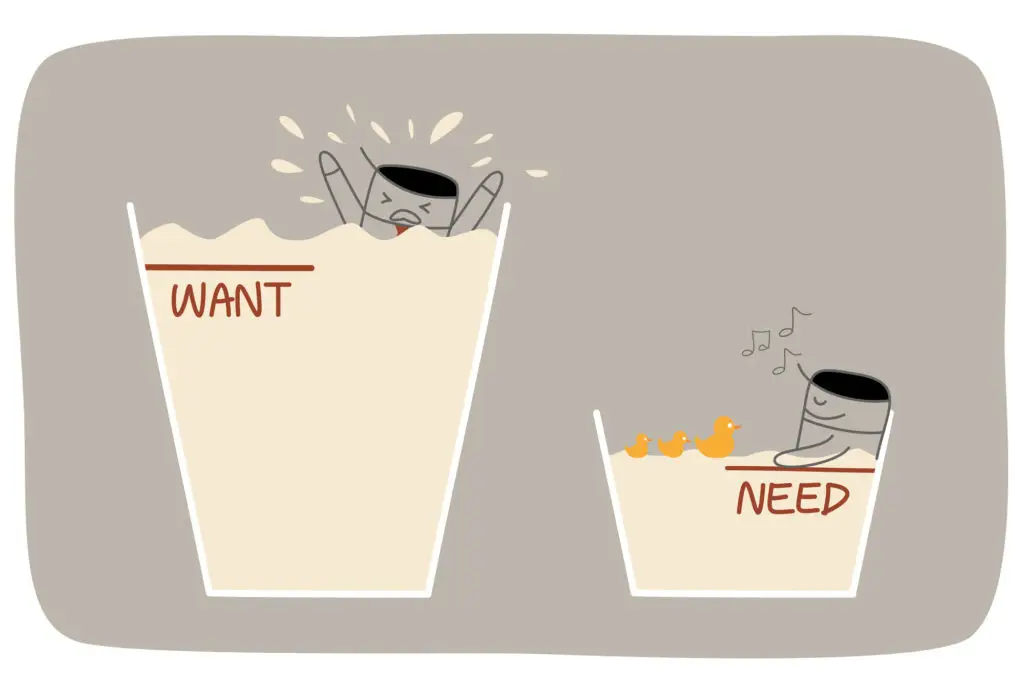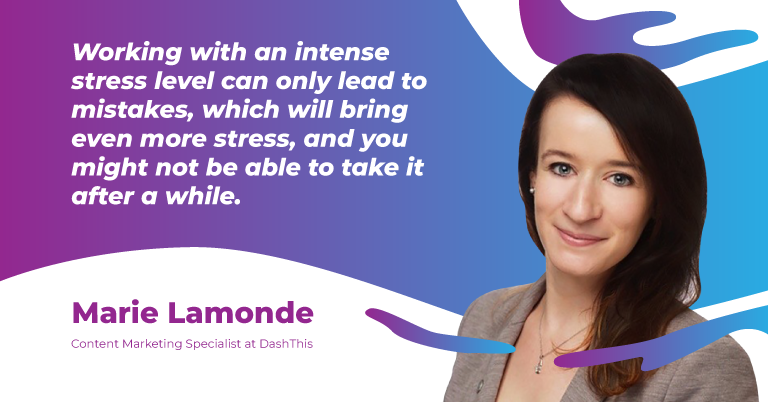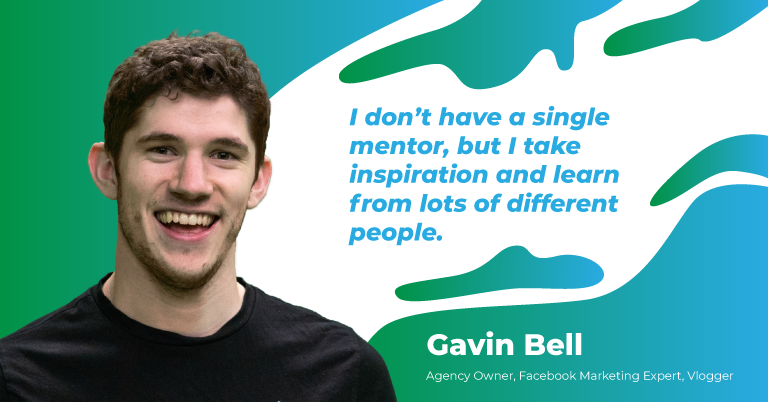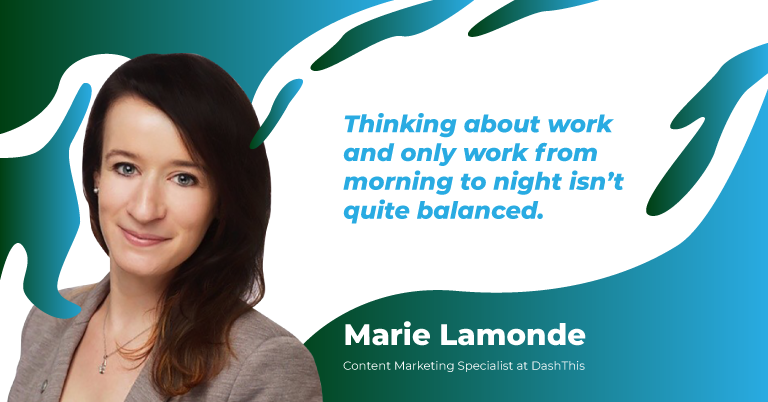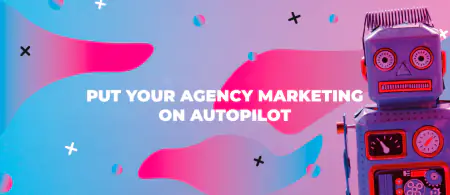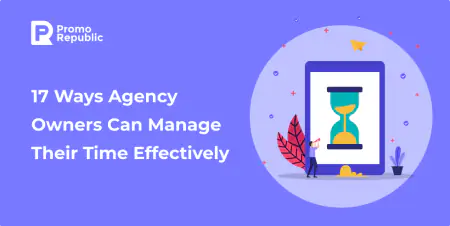17 Best Time Management Tips for Agency Owners
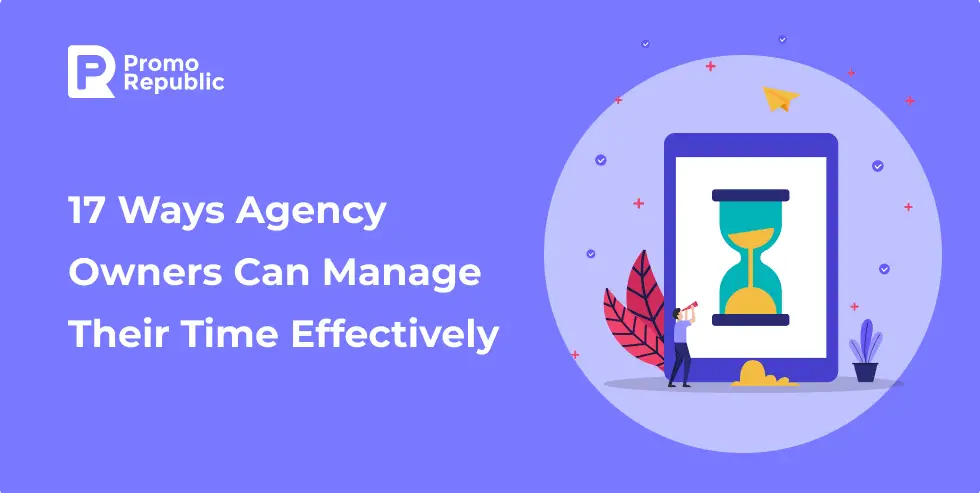
Have you ever spent time searching through books about being productive, instead of actually being productive? Who’s to blame that your work doesn’t hold water and a desire to scroll Facebook or Instagram is becoming ever stronger and stronger?
Mostly, a browser of any agency owner being looks like a chain of tabs which includes Google Spreadsheets, emails, dozens of articles to read, and some project management desks. Along with all these vital things, pop-ups and notifications grab attention or, wait. It’s better to say, divide your attention.
Then this frequent situation leads to a lack of time, hard work, and tight time trouble with which, not everyone can cope. Constantly being in, “I don’t know what to grab onto” mood can hardly be called appropriate when it comes to personal effectiveness.
The truth is, this happens to almost every person who needs to work with a computer. The good news though, this problem can be solved.
As Peter Drucker once said “Until we can manage time, we can manage nothing else. One cannot buy, rent or hire more time.”
What Is Time Management
It’s only 24 hours in the day, so making the most of your time is crucial. Whether you’re a newbie agency owner or a veteran knowing the ropes, it’ll be difficult for you to control every single minute of your day. No wonder, time is a thing many professionals can’t get enough.
If you don’t want to be a victim of a monster called ‘missed deadlines’, you need to learn as much as possible about effective time management.
17 Best Tips for Time Management
No matter what tasks in your to-do list, you can manage your time better to plan, execute, and achieve goals.
-
Set Measurable Goals
According to goal-setting research reported by Harvard in 1979, people almost never set goals for the future. It appeared that only 3% of respondents had both written goals and concrete plans.
Then, these same students were asked about the level of income they have reached in 10 years. This 3% of students who recorded the goal earned 10 times more than 97% combined.
Business leaders use a plethora of methods, tricks, strategies, and tools to figure out how to achieve their goal-destination.
Bill Gates uses what’s called the OKR method to better manage goals for time management, clearly see the objective and ways to get there. Generally, OKR calls for setting objectives that have to be achieved and metrics that will measure their achievements.
To help the ideas come to reality, Richard Branson writes down all his goals. He believes marking off every completed task helps keep him motivated. Writing takes your goals to the next level: visual level!
-
Define a Routine
Before you leave work, find at least 10 minutes at the end of the day to make a plan for tomorrow. There’s a 1-2-3 rule which allows you to define one really important task, two other larger tasks, and 3 or 4 smaller tasks. According to this technique the major mission of a day it’s not only a task: this is the #1 result you want to get for a certain # of hours.
That especially works for agency owners with a long-term business goal. Due to their habit to get caught in everything in every aspect of the business, they often suffer from a not doable list of tasks.
Therefore, forcing yourself to choose the tasks means you will accomplish tasks you really need to do, rather than go with the flow of random tasks that happened to be done.
The formula isn’t complicated:
- 2 big tasks, 2 hours each = 4 hours
- 3 small tasks, 30 minutes each = 1.5 hours
- Total Working Hours = 5.5 hours
A little caveat: If you have one must-do thing, move it in the first place instead of 2 big tasks.
-
Log Your Time With Tools
If you need to get done what you really need to get done, find out what tools may help you stay focused on what really matters. Every year hopeful entrepreneurs give birth to thousands of projects and tools which of them work well for you is possible to understand only after testing them out.
For marketing agencies that have many clients, it’s good to use collaboration tools. PromoRepublic allows agencies to stay white-labeled, so if you have 10 clients (or more), you can show each of them a content calendar to no one of them to know about each other. Whatever piece of content you’ve prepared for them will be unique, what’s more, your client can leave their “this is good” or “let’s change it” right inside the calendar. Try PromoRepublic for free to ease your client-agency collaboration.
-
Learn to Say NO
When it comes to organizing your own time the most important word is a polite “no.” There will be no hard feelings if you refuse and say ‘No’ to tasks that are not among the priorities you have chosen.
By saying no, you become a much better boss, friend, partner, colleague. You need to learn to feel what you really want – you will never say no if you do not understand.
The problem often is not about denying at all but saying “no” to a certain person — the client, family member, friend. In the meantime, the inability to refuse leads to a waste of time, effort, money.
As a result, you have to fulfill the promise, at the expense of something else that was scheduled for the same time.
Having learned to say “no,” you can learn how to set priorities correctly: sometimes to say “no” to someone means to say “yes” to your interests.
-
Set Time Limits
Before you start doing your favorite and fascinating work, you sip some tasty coffee for a while, surf websites mindlessly, scratch your head, and then still request to postpone the deadline.
In a popular TED video, Daniel Pink, a business analyst, shares an experiment ran by Sam Glucksberg of Princeton University. The idea of which was to ask participants to solve a brainy task: stick a candle so that it does not smear wax on either the wall or the floor. One group was told that their results would set the standard — the starting point for the next survey, the other was offered a cash reward. Participants from the first group solved the problem 3.5 minutes faster than their competitors fighting for the prize.
It became obvious to scientists: if a task requires at least elementary mental effort, money does not play a special role.
Although, if it is worth doing something simple, say moving a chair, the reward still works very well.
-
Make Short Breaks
Per a study published in Computers in Human Behavior, personal procrastination at work may positively influence your effective time management.
Psychologists from the US and Israel come up to unexpected conclusions that small pauses help workers reduce stress and do work better. That’s all because the brain needs to reboot. When your timer goes off, take a 10–15-minute break.
The study even has a couple of tips on how to while away the time cyber-goofing-off. For instance, “if you don’t like someone at work, try to make myself feel better by watching funny cat videos”.
-
Prioritize High-Performing Channels
Many small businesses that aspire to a greater social media presence look to large brands as their role models and seek to emulate the behavior they see i.e. maintaining active accounts on all the major social media networks. For many companies, this isn’t just difficult – it’s counterproductive.
Contrary to common misconception, you don’t necessarily need to be on every single social media platform, only those that are the most relevant and active for your audience. WordStream, for example, has a very active presence on Twitter, as that’s arguably the social media platform of choice for digital marketers, PPC experts, and many of our readers – but we’re not on Pinterest, simply because it isn’t relevant to our content or the needs of our audience.
Only focus your time and effort on social media channels that are delivering the results and engagement you want, and don’t waste time creating updates for channels that aren’t showing any return.
-
Outsource Specialized Projects to Contractors
Tackling brand-new projects that you’ve never worked on before can be exciting and great for professional development, but sometimes, these kinds of projects are the very worst time-sucks.
If you’re asked to do something that’s outside the typical range of your expertise, consider outsourcing the work to a contractor. Discuss this possibility with your manager if you’re feeling overwhelmed or anticipate that a project will take too much time to complete yourself.
-
Beat Procrastination with Zeigarnik Effect
In psychology, the “Zeigarnik effect” states that people tend to remember uncompleted or interrupted tasks more clearly than completed tasks. If you have a list of tasks, try to start each of them – then the memory will not give you peace of mind until you return to them.
Human nature is tricky: we feel the powerful urge to complete things. Literally, we will put effort to get tasks out of our system.
You can easily apply this effect when you learn new tools or develop your skills.
-
Create Dashboards
Face facts, the information age changes the way we consume, acquire, and organize information. This sounds a bit blurry, but only making the right decisions help businesses move toward their goals.
It’s all pretty much the same when it comes to business. Dashboards will provide you with feedback about the progress report.
Marie Lamonde, Content Marketing & Communications Specialist at DashThis, says
“To measure and track our team’s productivity, we create different dashboards and reports that we can either consult each week or month depending on the team and the objectives we set. For example, our sales team has a dashboard per month with their sales objectives, and they consult it each week to make sure they are on track. Our marketing team also has dashboards that they consult each week to see if their campaigns are doing well, and another monthly report to see the overall performance with some year-over-year data as well.”
Also, it’s a great idea to use reporting tools for your productivity improvement. Check out our webinar and find out how social media reports can make your life easier.
-
Audit Your Time Managing
By doing a time audit, you can boost your productivity. This is something like stopping and think about the black holes that suction up our priceless time.
First, identify any time drains during your day. What drains it? Do you spend too much time on social media? It’s not difficult to sort yourself out. Now iPhones reveal how long we’ve been using certain apps and let you place limits on app usage. You can also use a work time calculator to check how much time you actually spend on productive tasks. With this data, you can clearly see the areas to improve.
Secondly, it may be like you allowing other people to waste your time. These things requires some management. For instance, if a colleague comes to you at work to tell a story about their super romantic (sappy) date or a new sort of garlic-fishy flavored cat food — these are all having nothing to do with your work (probably) — try to track how much time you donated.
-
Get a Mentor
This isn’t a biological need, but you can’t even imagine how lucky you will be if you encounter a person who opens up new horizons for you — a mentor is essential for the personal development process.
Every human being can get lost because of a number of reasons. The right person can motivate you, fire up the energy inside you, and give you the impetus to face all sorts of difficulties with dignity.
Business leaders like Steve Jobs, Bill Gates, Michael Bloomberg had the upper hand at success by being able to lean on mentors for support and advice.
If you haven’t met a person who can help keep your businesses innovative and relevant, don’t get frustrated.
Gavin believes that mentors can 100% help you to be more productive in managing your time better. They’ve often been there and done it, so will have the answers to some of the questions that may have taken you a lot of time to figure out.
“But it needs to work for both parties. I don’t have a single mentor, but take inspiration and learn from lots of different people if and when I need them – with the internet you can have 100’s of mentors!” he adds.
-
Take Care of Yourself
Focus on your wellbeing, your physical and mental health. Remember to eat well, get enough sleep, and exercise. It gives you the energy to do what you love. Daily activity outside soothes your mood, makes you feel and look better.
In the fast-moving world, you need to slow down to ease your thinking into a more playful dialogue about what it means to live.
Marie Lamonde, from DashThis, a marketing reporting dashboard tool, believes that’s having a balanced lifestyle is crucial. She makes a calendar that helps her keep some time for exercise, leisure, and family in order to be more productive.
“Our brain will come up with fresh new ideas once it’s relaxed,” she notes.
-
Make your communication smart
How much time did you spend on the last meeting with your team? Sometimes people tend to spend days talking about excellent ideas, innovative approaches, or problems to fix.
At the meeting talk only about the important things — about the work at hand. Have a clear purpose in mind. It’s nice if you want to share how great Bali and coconuts are, but leave the emotion-sharing part for lunchtime. Work is work, especially at work.
Also, respect the time of others. Don’t schedule the meetings at the end of the day (your colleagues have their personal life!).
-
Get Rid of Productivity Myths
Psychoactive drugs seem to fire up long-desired productivity and creativity. But it’s still unclear whether this fact is self-deception or an unhealthy lifestyle’s propaganda.
The most popular productivity booster is caffeine. Although coffee used to be thought as a marvelous pepper-upper, it doesn’t give extra energy. It just frees up sources of energy that you already have. That’s why a cup of espresso makes you feel awake, energetic, and able to tag all your tasks as “resolved.” However this magical feeling doesn’t last long — when the reserved energy runs out, the stronger feeling of tiredness appears.
The thing is, a small cup of coffee won’t badly affect you. Caffeine powers up the adrenal glands, which then produces adrenaline and cortisol. Therefore, a large amount of caffeine can cause anxiety and irritability.
Your mind can be hit by new ideas, most in a relaxed state when thoughts wander without a certain direction. Caffeine narrows the zone of our attention and therefore can cramp creativity.
-
Delegate!
Since the best way to see how people go wrong is to actually do it for yourself — does this sound familiar to you? If so, that means you can’t work with a team.
Then you will never rise above the role of the duty-performer. It’s sad but true: all-task-doer-makers drive cheap cars, never become famous people, and never write memoirs.
A really intelligent person at a certain stage understands that it is impossible to hog the blanket. The sooner the ability to delegate and negotiate comes, the fewer chances to find yourself having no money and no energy.
When it comes to productivity, Marie Lamonde emphasizes that she delegates some of her responsibilities to employees she can trust.
Once you have less on your mind, you can spend more time with your family, disconnect from work from time to time, and relax.
-
Block Out Distractions
This includes emails, phone calls, and having dozens of tabs opened in a web browser. There’s nothing more powerful than the concentration (in a reasonable sense, of course).
Eve Edelstein, Director of the Human Experience Lab at Perkins+Will, believes that our 5 senses; touch, smell, taste, sight, and hearing, strive to distract us away from focusing on work. No wonder it’s pretty hard to create a detailed report in a place where somebody talks on the phone or slurps. Her survey showed that 68% of workers can hardly concentrate and get tired quickly when the level of background noise exceeds the volume of normal speech.
In his interview to The New York Times, Cal Newport, one of the originators of deep work, says:
“In order for a session to count as deep work, there must be zero distractions. Even a quick glance at your phone or email inbox can significantly reduce your performance due to the cost of context switching.”
Wrapping Up: How to Manage Time Wisely
Three of the most effective ways of managing time efficiently are the most boring rules in the world. You have heard about them a hundred times. It just so happens they work the best:
– eat well
– sleep enough
– get some physical exercises
Keep at them (and these 15 above) to successfully manage your day and utilize your time to the max!

local marketing tips monthly
Enterprise: for multi-location and direct selling brands. Manage thousands of social media pages of your local distributors, partners, or franchisees.
Agency: for marketing agencies. Manage all your clients’ social media pages on one platform.





